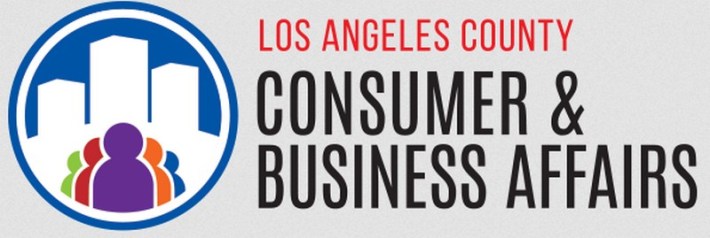L.A. TACO recently popped by the headquarters of Los Angeles County Department of Consumer and Business Affairs (DCBA), where we spoke with DCBA rent counselors who serve on the front lines of the County’s housing crisis.
These professionals have dedicated themselves to guiding landlords and tenants alike through complex housing and tenant protection policies, in order to keep families housed in an increasingly challenging rental market.
“The most recent case that I had was helping a tenant receive a little over $16,000 [in overpayments],” one counselor told L.A. TACO, highlighting the vital financial impact their work has on the lives of L.A. County residents.
Another counselor described their role as being like “the Google of housing and tenant protections,” providing critical information when tenants and landlords need it most.
These counselors take pride in helping tenants (including mobile home space renters) and property owners understand the Rent Stabilization and Tenant Protections Ordinance (RSPTO) and Mobilehome Rent Stabilization and Mobilehome Owner Protections Ordinance (MRSMOPO).
One noted that their favorite part of their job is “seeing somebody walk away after speaking with them with the ability to fight an invalid rent increase.” With updates to one of the County’s ordinances taking effect in 2025, as well as the Tenant Right to Counsel Ordinance, their work is more important than ever.

The Basics
The County’s RSTPO limits annual rent increases for rent-stabilized units and provides protections against unjust evictions, harassment, and retaliation. The MRSMOPO limits annual rent increases for mobile home spaces and provides protections against harassment and retaliation. The ordinance also allows property owners to seek relief if they believe the permitted rent increase does not provide a fair return on their rental units.
Current Rent Increase Limits
As one counselor noted in our interview, “In the 2025 rent stabilization and tenant protections ordinance, the main change is the difference in rent increases.”
Under the RSTPO, the maximum allowable rent increases are as follows:
- January – June 2025: Most landlords may raise rent by up to 2.565%.
- July 2025 – June 2026: Rent increases will be limited to 1.930%
Special categories with higher allowable increases include:
- Small Property Landlords: May add an additional 1%
- Luxury Units: May add an additional 2%
Under the MRSMOPO, the maximum allowable rent increases are as follows:
- Between January and June 2025, park owners can only raise rent by 3.206%.
- Rent increase limits for the upcoming period (July 2025 – June 2026) will be limited to 3%.
Who Qualifies as a Small Property Landlord?
Small Property Landlords must:
- Receive a Homeowners' Property Tax Exemption for the property, or own only one rental property with no more than 10 units, or own no more than three (3) properties with a combined total of no more than 10 units
- Small Property Landlords must submit an annual Self-Certification to DCBA.
Rent increase notices to tenants must include a statement that the landlord meets the requirements for Small Property Landlords and Luxury Units.
Just Cause Eviction Protections
Tenants in units covered by the RSTPO can only be evicted for specific "Just Cause" reasons which fall under 2 categories, At-fault and No-fault:
At-Fault reasons (meaning the tenant has broken the rental agreement) include:
- Failure to pay rent exceeding the monetary threshold
- Material breach of the rental agreement
- Creating a nuisance or illegal use of the unit
- Failure to sign a substantially similar lease
- Failure to vacate as required by the approved relocation application
- Households exceeding income limits in government-regulated units
No-Fault reasons (which may require relocation assistance) include:
- The owner or owner’s family member is moving in
- The rental unit has been withdrawn from the rental market
- Government agency or court order
Right to Counsel Program
The Tenant Right to Counsel Program, fully operational as of January 1, 2025, provides free legal representation to eligible tenants facing eviction in Los Angeles County to help keep them housed. This program has become a critical resource during housing emergencies, like the recent fires where, as one counselor shared, tenants “lost everything” and landlords weren’t always aware of their ongoing responsibilities.
“We are not only a hub for information, but we’re actually a support system for the community,” a counselor explained, highlighting how DCBA helps vulnerable residents navigate complex legal situations.
Resources for Tenants
If your rights under the County’s Rent Stabilization Ordinances have been violated, such as your rent increasing beyond the allowable limit, tenants can file an Application for Adjustment with DCBA.
Stay Housed L.A. (stayhousedla.org) provides free information and resources to help tenants understand their rights.
As the counselors emphasized during our interview, their interactive approach to explaining tenant rights makes all the difference.
“It’s really important to walk people through the website so they can find something called a “Notice of Tenant Rights,” which explains the ordinance’s three main components: rent control, eviction protections, and protections from landlord harassment or retaliation.
Is Your Rental Covered?
To find out if your rental property, unit, or mobile home space is covered, visit the L.A. County Rent Registry at dcba.lacounty.gov/rentregistry.
For more information about the County's Rent Stabilization Ordinances, or assistance in understanding tenant, mobile home owner/space renter, and landlord rights and responsibilities in unincorporated L.A. County, visit rent.lacounty.gov or contact DCBA Rent Counselors at 800.593.8222.
To determine if your property is in an unincorporated area, visit lavote.gov/apps/precinctsmaps and choose "District Map Look Up By Address” from the drop-down menu.
If you have received an eviction notice or want to learn more about the Tenant Right to Counsel Program, visit www.stayhousedla.org/unincorporated.







